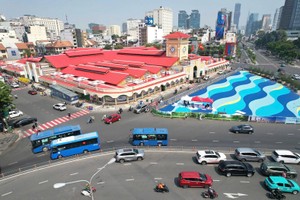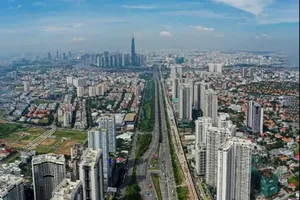
Hundreds of residents at the Tan Phuoc apartment complex in Minh Phung Ward are living in a state of unease. The source of their worry comes from four electric cars parked in the building’s basement.
In response to residents’ concerns, the building’s management board issued a swift notice: “To ensure the safety of the Tan Phuoc apartment building, as of July 23, 2025, the management will no longer accept any electric-powered vehicles, including electric bikes, electric motorbikes, and electric cars, in the basement parking area.”
While the notice was sent out, it didn’t quell the anxiety. For the electric vehicle (EV) owners living in the building, it created an immediate dilemma, leaving them scrambling to figure out where to park their cars after coming home from work.
A similar situation can be found in the Tam Phu apartment complex in Tam Binh Ward of HCMC. Bui Thanh Phuc, a resident here, said that recent, highly publicized EV fires have left a haunting memory. “These incidents have caused devastating losses of property and life”, he explained.
The growing number of residents switching to EVs has put immense pressure on buildings that lack the proper infrastructure, adding the fear of fire to the existing problem of parking shortages.
To ensure residents’ safety, his building’s management also issued a ban: “All electric vehicles are prohibited from the basement. It is absolutely forbidden to bring EVs or their batteries into elevators or up to apartments for charging.”
This isn’t just an HCMC problem. In other cities and provinces, management boards are taking similar steps. Citing the potential risks, the management of The Pegasus Plaza in Dong Nai Province has also prohibited EVs from its basement to “ensure fire safety for the entire building”.
This growing conflict comes just as HCMC is pushing for a transition to “green transport”. The city has a plan to convert 400,000 vehicles used by app-based ride-hailing and delivery drivers by 2029, supported by a range of incentives. This means the number of EVs is set to skyrocket, making the need for safe parking and charging in residential buildings more urgent than ever.
The reality, however, is that both old and many newly built, modern apartment complexes have “forgotten” to include dedicated EV infrastructure. Buildings with properly designed and fire-safe parking and charging stations can only be counted on one hand.
Nguyen Phong Dien lives in Popal Boulevard (Di An Ward of HCMC), one of the few exceptions. “Our building’s basement was designed with dedicated parking spots and a charging system that meets fire safety standards”, he said. “We can comfortably park our electric cars and bikes here, unlike our neighbors in other buildings who are always scrambling to find a place.”
The contrast is stark. Head Le Van Quang of the management board of the Tan Phuoc apartment complex explained that his building, constructed in 2016 with over 1,000 units, has no such facilities. Earlier this year, a survey found that 80 percent of residents opposed allowing EVs in the basement.
In response, the board has been forced to find makeshift solutions. They’ve arranged off-site parking for the four electric cars, are building a temporary outdoor shelter for e-bikes, and have purchased two specialized fire extinguishers designed for battery fires. But as Quang admits, these are just temporary, “stopgap measures”, not a fundamental, sustainable solution.
Deputy Head Tran Thuong of the Tam Phu apartment management board said that to serve the needs of the people, the management board has built a garage for electric vehicles and a charging station. Staff regularly inspect, maintain, repair, and replace equipment serving electric vehicles, while also updating information and fire safety measures for vehicle users.
The charging fee for electric vehicles is applied at VND50,000/month (US$1.9) for electric bicycles; VND70,000/month ($2.7) for vehicles for commuting, and VND250,000/month ($9.5) for electric vehicles for service running.
“The measures taken by the apartment management board to support residents using electric vehicles regarding parking and charging points are only situational solutions. The State needs to create fundamental and sustainable policies and plans; otherwise, the city’s green transport development goals will be difficult to achieve, because there’s simply nowhere for people in apartment buildings to park and charge”, the Deputy Head stressed.
























